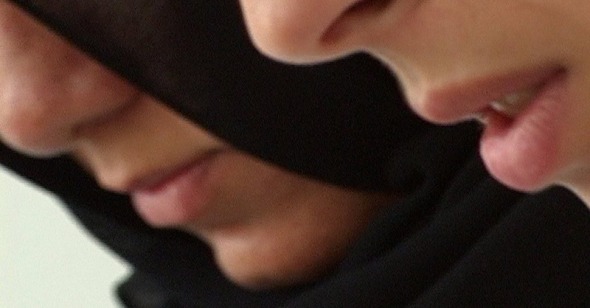Irreconcilable Differences
by Michael Koresky
A Jihad for Love
Dir. Parvez Sharma, U.S., First Run
Homosexuality isn’t a choice, but often, many forget, neither is religion. And this is certainly the case for the world’s dense population of devout Muslims, now comprising the second largest religion in the world. Since the dictates of various orthodoxies seem almost by design to painfully rub up against basic biological desires, the demonization of sexuality has been widely reported upon and dramatized, whether directly or indirectly, for as long as there has been sophisticated thought. And though the most blatant and rigorous denial of carnal desire is extended, as ever, to homosexuality, only in recent years have we been granted the courtesy of fine documentaries such as Sandi Dubowski’s Trembling Before G-D and Daniel Karslake’s For the Bible Tells Me So, primers on the eternal battle of conscience and love waged in the minds of gay individuals for whom abandoning faith-based communities is not an option. For them, the need to touch another human body does not preclude the desire to be close to God; of course, in dealing with a handful of extreme, sexually repressive Islamic societies, Parvez Sharma’s passionate, yet reserved new documentary A Jihad for Love can’t help but seem even more urgent.
Sharma, a gay writer, reporter, and filmmaker born in India, is himself a Muslim, and his lack of condescension toward the religious communities he captures on film is A Jihad for Love’s greatest strength. Sharma excels at depicting the effects of repressive regimes on individuals in a matter-of-fact manner, without the aid of overly cute populist doc tricks or direct audience appeals; one comes away with the sense that Islamic governmental law based on religion isn’t so different from nonsecular Westernized rationalizations for discrimination. Indeed, there’s a terrific scene in which Muhsin Hendricks, an Islamic scholar and Imam in Johannesburg, questions the very existence of any sort of anti-homosexual decree in the Quran, citing the Old Testament tale of Sodom and Gomorrah as the most oft misconstrued passage of all, in which God’s condemnation of rape has been twisted to include all forms of male-male love. It happens to be the same argument made by Western scholars in Karslake’s film, and though it’s been used in such nations as Saudi Arabia and Iran as the base rationale for government-sanctioned punishment and execution, it unites religious intolerance in harmonious discord.
Despite the instructive necessity of scenes like these, it’s A Jihad for Love’s focus on the personal conflicts, tortures, and everyday quandaries of articulate, desperate people like Hendricks that truly ennoble the film. “Help us remove this desire and replace it with love,” a praying woman is heard saying at the beginning of the film, and it’s a stunning phrase, heartbreaking in the fact of its irreconcilability, which defines all of the film’s principal subjects. Some show their faces and some do not, yet when they have chosen not to Sharma heightens their abstraction to both humane and artistically valid ends -- the closeness of human bonds and the rights of two people to lovingly touch one another are impossible to misrepresent. The decision for some—like Amir, an Iranian seeking asylum and living as a refugee in Turkey with other young, ostracized gay men in one cramped room, or Maryam and Maha, a Moroccan and Egyptian lesbian couple—to not show their face on-camera does not make them any less brave than those who do, including middle-aged Sufi lesbian couple Ferda and Kiymet, living in the more sexually permissible Istanbul, and the Egyptian Mazen, who had been imprisoned and tortured as one of the “Cairo 52,” men rounded up from a gay club, before remaking his life in Paris.
Yet when Mazen calls home to his mother, invoking Allah with reverence, Sharma’s film reinforces the fact that complete escape is not only impossible, but in many cases, unwanted. A Jihad for Love depicts those who do not reject their faith but must also choose survival. The movie isn’t perfect—even for an eighty-minute film shot in twelve countries and following at least eight principal personages there’s a bit of narrative filler, including Ferda and Kiymet’s rambling conversation about the presumed sexuality of a parrot, and too often Sharma relies on an overly familiar slow-mo-imagery-and-melismatic vocals to string together scenes. But as a document of testimonials from those who otherwise dare not speak, and for whom being gay is like being born, inextricably, into the lowest possible caste, A Jihad for Love is invaluable.
